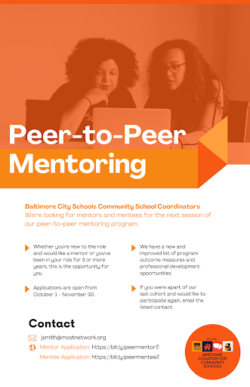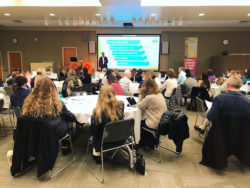The Four Stages
- Exploring
-
- Local community school lead partners conduct internal training
- Community school leaders participate in Coalition for Community School’s convenings, network activities, and webinars
More on convenings:
The Coalition for Community Schools hosts a yearly national gathering for Community School and Family Engagement professionals. More information can be found here: https://www.communityschools.org/events/
- Emerging
-
- State standards are developed; state standards are aligned with national standards
- State Coalition lead partners organize capacity building with lead partners at both the state and local levels to align with site standards
- State Coalition leaders participate in relevant Coalition for Community Schools networks and activities
- Evolving
-
- Statewide capacity building system is in place
- Common impact measures are in place
- Data (quantitative and stories) collection systems are in place to identify, analyze, illuminate, and inform State Coalition efforts
- Participating partners share expertise in organized trainings, events, and or meetings on specific areas of interest for improvement
- An annual learning exchange is conducted for networking and knowledge sharing in continuous improvement and deepening relationships
- Shared tools are developed for state specific implementation guidance
Examples of participating partners sharing expertise in organized trainings, events, and or meetings on specific areas of improvement and deepening relationships:
Maryland’s Peer to Peer Network is a professional mentorship program connecting experienced Community School Coordinators to brand new Community School Coordinators in the Baltimore area. In its first two years, the Peer-to-Peer Network has supported 18 new Coordinators.
This structured mentorship program helps mentees develop strong Community School foundations, connect into a network of supportive colleagues, connect to community resources, and learn best practices from an experienced Coordinator, while also receiving professional development credit. Mentors are given a handbook that guides the mentorship process. Mentors receive an hourly stipend and previous participants have shared that the program further developed their leadership skills.
For more information, please contact the Maryland Coalition for Community Schools at info@mostnetwork.org

The 2016 national Community Schools conference (hosted by IEL/Coalition for Community Schools in Albuquerque, NM) was the inception of the Wisconsin State Coalition for Community Schools. A state breakout session during the conference allowed Wisconsin Community School advocates to unite in their interests and discuss ongoing opportunities to strengthen and grow Community Schools in Wisconsin. At this time, it was determined that participants had an interest in continuing to meet past the conference.
As this state network emerged, a small group stepped up to facilitate ongoing meetings and engage and align members. Participants indicated a desire for focusing on shared learning and spreading best practices during meetings. The steering committee surveyed participants to identify key topics and sought out local practitioners who could speak on their experiences as they related to the desired topics of focus and a consultancy protocol was used to structure the learning time. Topics included needs/asset assessments and moving from study to action, family engagement, community organizing, and other topics relating to the systems and functions of high quality Community Schools.
Each meeting began to follow a similar format including networking, shared learning experiences, and updates on national Community Schools momentum. Since its inception, network participation has continued to grow. Network participation consists of initiative level leaders (a role that supervises/supports several Community School Coordinators across a system of Community Schools), Community School Coordinators, School and District Administrators, and University partners.
Wisconsin Community Schools have grown during this time, from 3 communities to 7 communities implementing Community Schools. This network has provided a venue for shared learning and creating professional connections that help Community School professionals feel more supported in a new profession that can at times feel isolating; the network has helped create a sense of community and collaborative action for Wisconsin’s Community School professionals.
For more information on the Wisconsin State Network for Community Schools, contact: Glenn Carson, gcarson@unitedwaygmwc.org
Example of an annual learning exchange:
The first Idaho Community Schools Conference was hosted in January of 2017. Initially planned as a small workshop of 30 people to create awareness around Idaho’s emerging Community School movement, interest grew quickly and soon 80 people requested to attend the event. The event was moved to a new venue to accommodate 80 participants and was a huge success in its first year. A half day event hosted by United Way of Treasure Valley staff members, the event included local Community School Coordinators, Administrators, and service provider partners who shared their stories about the Community School strategy. The event was a huge success and garnered much new momentum for the Idaho Community School movement.
Due to its success, participants requested the event be hosted again in January of 2018. In its second year, the conference was titled the Idaho Community School Power Up Conference, and José Munoz (Director of the Coalition for Community Schools) was invited to be the keynote speaker. The day long conference included local practitioners sharing their stories and the event was virtually broadcasted to the entire state so participants outside of southern Idaho could engage. Each year since it’s launch, the Idaho Community School Conference has had between 80-120 participants made up of Community School Coordinators, school professionals and administrators interested in starting Community Schools, service providers and community based organizations, community members and advocates, as well as local elected officials. Each year the conference has grown, and engaged national Community School experts including Tauheedah Jackson (formerly with the Coalition for Community Schools), Abe Fernandez (National Center for Community Schools), Donnie Hale (Coalition for Community Schools), and Jim Grim (IUPUI) alongside local practitioners. Since the launch of the Idaho Coalition for Community Schools in 2019 (facilitated by the United Way of Treasure Valley), the conference has been a collaborative effort of coalition partners and included separate tracks for those just learning about the strategy and those more experienced in Community Schools.
Promotion of the event has continued to grow statewide due to a strong partnership with the Idaho State Department of Education who have continued to promote this event to a larger audience of schools. The event has had sponsors to keep the financial burden minimal, the conference was free for many years and in recent years has only been minimal. Professional development credit has been offered through a partnership with a local university, and many participants have been grateful for this option to learn about Community Schools while also meeting the requirements of their state licensure.
This event sparked the development of a monthly learning exchange for Idaho Community School professionals, which has been happening regularly since the 2nd year of the conference. Inception of the Idaho Coalition for Community Schools also began as an idea at this conference. It has helped generate momentum, ignite excitement, and create awareness for Community Schools throughout the state of Idaho.
For more information on the Idaho Community School Conference, please contact ICCS@unitedwaytv.org

Idaho Community Schools Conference, 2019
- Expanding
-
- Data is used to inform State Coalition’s activities and communications
- State Coalition is working in regional clusters with others for knowledge sharing, sustainability, and scaling practices
- A funders network is established to support sustainability of State Coalition and partner activities
Example of a funders network established to support sustainability of State Coalition and partner activities:
The Idaho Coalition for Community Schools’ Funding Partnership began in Fall of 2021. The Idaho Coalition for Community Schools (ICCS) partners recognized growing interest from Idaho funders in supporting Community School strategies. ICCS partners met with interested funders to discuss funding opportunities, and an interest in collaborative funding surfaced. Ongoing conversations identified the desire to help existing Community Schools increase their impact, while also launching new Community Schools.
The ICCS first designed a technical assistance grant process, where existing Community Schools throughout the state could apply for a $10,000 flexible stipend and receive expert technical assistance and coaching from the National Center for Community Schools (NCCS). Schools completed a short application, and selected schools entered a cohort of schools receiving this guided support together, known as Cohort A. Funders of Cohort A included Blue Cross of Idaho Foundation for Health and United Way of Treasure Valley, who partnered to cover stipend and technical assistance costs and the administrative capacity needed to oversee the grant process. Technical assistance from NCCS was provided through guided coaching sessions for Community School Coordinators and special sessions for both Community School Coordinators and their Administrators.
After the launch of Cohort A, additional funders opted in. The second phase of this funded partnership became known as Cohort B and included schools who were interested in becoming a Community School. With the addition of new funding partners, a collaborative fund was needed to manage the combined resources. The ICCS worked with the Idaho Community Foundation (ICF) to establish a fund and created a working agreement with all funding partners. Funding partners included Blue Cross of Idaho Foundation for Health, United Way of Treasure Valley, United Way of South Central Idaho, Saint Luke’s Health System, an anonymous donor, and other government and nonprofit entities.
Twenty-two schools applied in early 2022 for a $10,000 flexible stipend paired with expert technical assistance and coaching from the National Center for Community Schools (NCCS). Eleven schools were selected to participate in Cohort B, receiving technical assistance and coaching to lay the foundations for a successful new Community School strategy.
Schools who completed the technical assistance in Cohort B were then invited to apply for implementation funding to support the hiring of a Community School Coordinator. Four schools from Cohort B were funded in fall of 2022 to hire a full-time Community School Coordinator, and three additional schools from the original Cohort A were funded to increase their part-time Community School Coordinator to full-time employment.
Existing Community Schools who participated in Cohort A said this process helped increase collaborative leadership practices between Community School Coordinators and Administrators, helped Community School decision making processes be more inclusive, and elevated their Community School to focusing on preventative and systematic strategies rather than programmatic and basic needs strategies.
Cohort B schools were able to lay stronger foundations for more collaborative, inclusive, and systematic approaches to their Community School work, leading to schools implementing the Community School strategy with higher fidelity.
This funding partnership has been a successful example of blending resources to support Community Schools in Idaho and was the first time several of these funding partners have invested in Community Schools.
For more information on this funding partnership, please contact ICCS@unitedwaytv.org